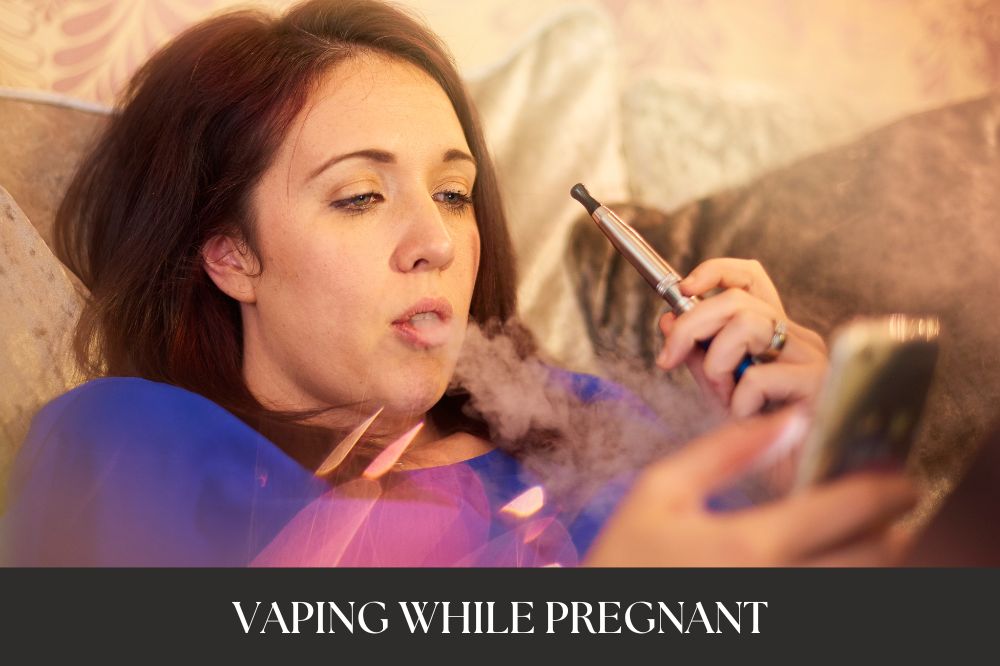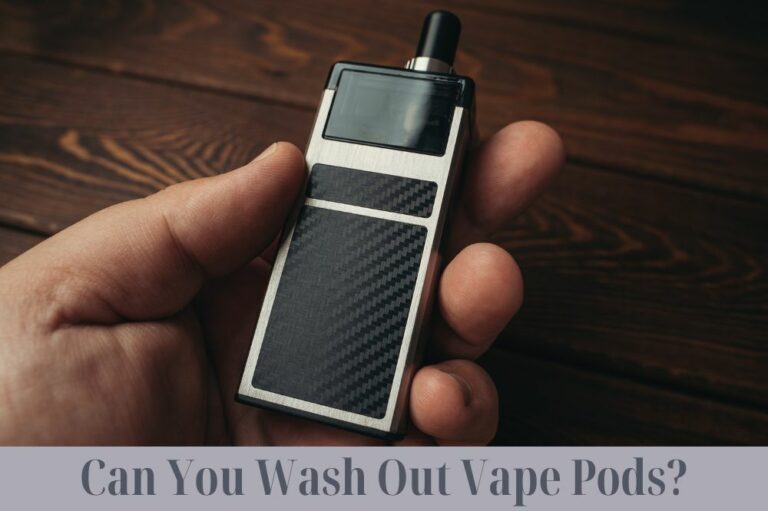
Vaping while pregnant is a topic that has been gaining attention in recent years. With the increasing popularity of e-cigarettes, many women may be wondering whether it is safe to use them during pregnancy.
According to the Mayo Clinic, using electronic cigarettes (vaping) during pregnancy isn’t safe. Most electronic cigarettes (e-cigarettes) contain nicotine, which permanently damages a baby’s developing brain and many other organs. The Centers for Disease Control and Prevention (CDC) and a 2016 Surgeon General report say that e-cigarettes are not safe for pregnant women, but because vaping has a potential benefit to smokers who are not pregnant, researchers are still conducting studies.
Despite the potential risks, some pregnant women may still believe that vaping is a safer alternative to smoking. In this article, we will explore the potential risks associated with vaping during pregnancy and provide information to help women make informed decisions about their health and the health of their unborn child.
Understanding Vaping
Vaping, or the use of electronic cigarettes, has become increasingly popular in recent years. While some people believe that vaping is a safer alternative to smoking, there are still many concerns about the potential risks associated with this practice.
Electronic cigarettes work by heating a liquid that contains nicotine, flavorings, and other chemicals. The user then inhales the resulting vapor, which is often referred to as “vape juice” or “e-juice.”
One of the main concerns about vaping is the fact that many e-juices contain nicotine, which is highly addictive. Nicotine is also known to have negative effects on fetal development, making it particularly dangerous for pregnant women.
In addition to nicotine, e-juices often contain other chemicals that can be harmful to both the user and their developing fetus. These chemicals can include things like formaldehyde, acetaldehyde, and acrolein, all of which have been linked to a variety of health problems.
Overall, it is important to remember that vaping is not a safe alternative to smoking, particularly for pregnant women. If you are pregnant and struggling with nicotine addiction, it is important to talk to your healthcare provider about safe and effective ways to quit.
Effects of Vaping on Pregnant Women
As a pregnant woman, it is important to be aware of the potential risks associated with vaping. While vaping may seem like a safer alternative to smoking, it still poses risks to both the mother and the developing fetus.
One of the main concerns with vaping during pregnancy is the exposure to nicotine. Most e-cigarettes contain nicotine, which can have negative effects on fetal development. Nicotine can restrict blood flow to the placenta, which can lead to low birth weight and other complications. Additionally, nicotine can also cross the placenta and affect the baby’s brain development.
In addition to nicotine, e-cigarette liquids also contain other chemicals and additives that may not be safe for the developing fetus. These chemicals can potentially harm the baby’s organs and lead to long-term health problems.
It is important for pregnant women to understand that there is currently a lack of information on the long-term effects of vaping during pregnancy. While some women may use e-cigarettes as a smoking cessation tool, it is important to speak with a healthcare provider about safe alternatives for quitting smoking during pregnancy.
Overall, the potential risks associated with vaping during pregnancy should not be taken lightly. Pregnant women should avoid vaping and seek out safer alternatives to smoking.
Impact of Vaping on Fetal Development
As per a study conducted by the University of Colorado Anschutz Medical Campus, vaping nicotine while pregnant can negatively impact fetal development, and may be no safer for a developing fetus than smoking cigarettes (source). Identifying the effects of maternal e-cigarette exposure on fetal development is essential to inform public health messaging and protect the health of both mother and child.
Brain Development
Nicotine exposure during fetal development can have long-term effects on brain development (source). Nicotine can cross the placenta and enter the fetal brain, where it can disrupt the normal development of the brain’s reward system, which is responsible for regulating mood, attention, and impulse control. Nicotine exposure during fetal development can increase the risk of behavioral problems, attention deficit hyperactivity disorder (ADHD), and other cognitive and developmental problems in childhood and adolescence.
Lung Development
Vaping during pregnancy can also negatively impact lung development in the fetus. Nicotine exposure can reduce the amount of oxygen available to the fetus, which can lead to reduced lung growth and function (source). Additionally, the chemicals and additives in e-cigarette liquids can irritate the lungs and airways, increasing the risk of respiratory problems in the fetus.
Heart Development
Nicotine exposure during fetal development can also affect the development of the fetal heart. Studies have shown that nicotine exposure can increase the risk of congenital heart defects in the fetus, such as atrial and ventricular septal defects (source). These defects can cause serious health problems and may require surgery to correct.
In summary, vaping nicotine while pregnant can negatively impact fetal development, particularly brain, lung, and heart development. Pregnant women should avoid vaping and smoking to protect the health of their unborn child.
Long Term Consequences of Vaping While Pregnant
Impact on Child’s Health
As a pregnant mother, it is important to consider the long-term consequences of vaping on your child’s health. Vaping during pregnancy can have several potential side effects on the child, including an increased risk of premature birth, low birth weight, and long-term developmental issues. A recent study published in the Journal of the Endocrine Society found a correlation between e-cigarette use and embryo toxicity, which can lead to a range of developmental issues for the child.
Additionally, vaping during pregnancy can cause long-term pulmonary effects in the child. A study conducted by Ohio State University found that vaping while pregnant can cause long-term health effects for the offspring, including a decrease in lung function and an increased susceptibility to respiratory infections.
Impact on Mother’s Health
Vaping while pregnant can also have long-term health consequences for the mother. Nicotine vaping is substantially less harmful than smoking, but it is still harmful. Vaping can cause a range of health issues, including lung problems, heart disease, and cancer. Vaping can also lead to fertility difficulties, according to a study published in Fertility Choices.
It is important for pregnant women to understand the potential risks associated with vaping and to make informed decisions about their health and the health of their child. If you are pregnant and considering vaping, it is recommended that you speak with your healthcare provider to discuss the potential risks and benefits of vaping during pregnancy.
Alternatives to Vaping During Pregnancy
As vaping during pregnancy is not safe, it is important to find alternatives to help quit smoking. Here are some options:
Nicotine Replacement Therapy (NRT)
NRT is a type of medication that provides nicotine without the harmful chemicals found in cigarettes. It can come in the form of gum, patches, lozenges, or inhalers. NRT can be a helpful tool to quit smoking during pregnancy, but it is important to talk to a healthcare provider before starting any medication.
Behavioral Therapy
Behavioral therapy can help pregnant women quit smoking by changing their habits and thought patterns. This type of therapy can be done one-on-one with a counselor, in group sessions, or even through phone or online sessions.
Support Groups
Joining a support group can provide pregnant women with the encouragement and motivation they need to quit smoking. Support groups can be found online, in-person, or through healthcare providers.
Exercise
Exercise can help reduce cravings and improve mood, making it easier to quit smoking. Pregnant women should talk to their healthcare provider before starting any exercise program.
Mindfulness Techniques
Mindfulness techniques, such as meditation or deep breathing, can help reduce stress and anxiety, which are common triggers for smoking. These techniques can be learned through classes or online resources.
It is important to remember that quitting smoking during pregnancy is not easy, but it is possible. Pregnant women should talk to their healthcare provider about the best options for them and their baby.
Professional Medical Advice on Vaping While Pregnant
As a medical professional, I strongly advise against vaping during pregnancy. Vaping during pregnancy is not safe and can cause harm to both the mother and developing baby.
Most electronic cigarettes (e-cigarettes) contain nicotine, which can permanently damage a baby’s developing brain and many other organs. E-cigarette liquids also contain chemicals, flavors, and other additives that might not be safe for your baby. There is emerging evidence that vaping during pregnancy may increase the risk of small for gestational age newborns.
Pregnant women who use vaping products for smoking cessation should consider alternative methods to quit smoking. Talk with your healthcare provider about your thoughts on quitting. There is also free advice, support, and referrals, with the Smoker’s Quitline at 1-800-QUIT-NOW (1-800-784-8669) from anywhere in the U.S.
In addition to the dangers of nicotine, e-cigs contain many other toxic chemicals that can harm you and your developing – or nursing – baby. We don’t know that vaping is less harmful than smoking or if it can help you quit smoking, but there are safer alternatives available.
It is essential to prioritize the health of both you and your baby during pregnancy. If you have any concerns or questions about vaping while pregnant, I strongly encourage you to speak with your healthcare provider for more information and guidance.
Sure, here’s the section you requested:
Frequently Asked Questions
Is it safe to vape while pregnant?
No, it is not safe to vape while pregnant. According to the Mayo Clinic, using electronic cigarettes (vaping) during pregnancy isn’t safe. Most electronic cigarettes (e-cigarettes) contain nicotine, which can permanently damage a baby’s developing brain and many other organs.
What are the risks of vaping while pregnant?
There are many risks associated with vaping while pregnant. According to HealthyChildren.org, vaping can cause harm to the developing fetus, including premature birth, low birth weight, and sudden infant death syndrome (SIDS). Additionally, nicotine can cause problems with brain development, lung function, and other organs.
Can vaping harm my unborn baby?
Yes, vaping can harm your unborn baby. Nicotine and other chemicals in e-cigarettes can cross the placenta and enter your baby’s bloodstream. This can cause harm to your baby’s developing brain, lungs, and other organs. According to BabyCenter, vaping can also increase the risk of stillbirth, miscarriage, and birth defects.
How can I quit vaping while pregnant?
If you are pregnant and vaping, it is important to quit as soon as possible. According to K Health, quitting vaping can be difficult, but it is possible. You can talk to your doctor about nicotine replacement therapy (NRT) or other medications that can help you quit. You can also try counseling or support groups to help you quit.
What are the alternatives to vaping while pregnant?
There are many alternatives to vaping while pregnant. According to HealthyChildren.org, you can try nicotine replacement therapy (NRT), such as patches, gum, or lozenges. You can also try counseling or support groups to help you quit.
What are the effects of nicotine on a developing fetus?
Nicotine can have many negative effects on a developing fetus. According to the Centers for Disease Control and Prevention (CDC), nicotine can cause problems with brain development, lung function, and other organs. Nicotine can also increase the risk of stillbirth, miscarriage, and birth defects.








